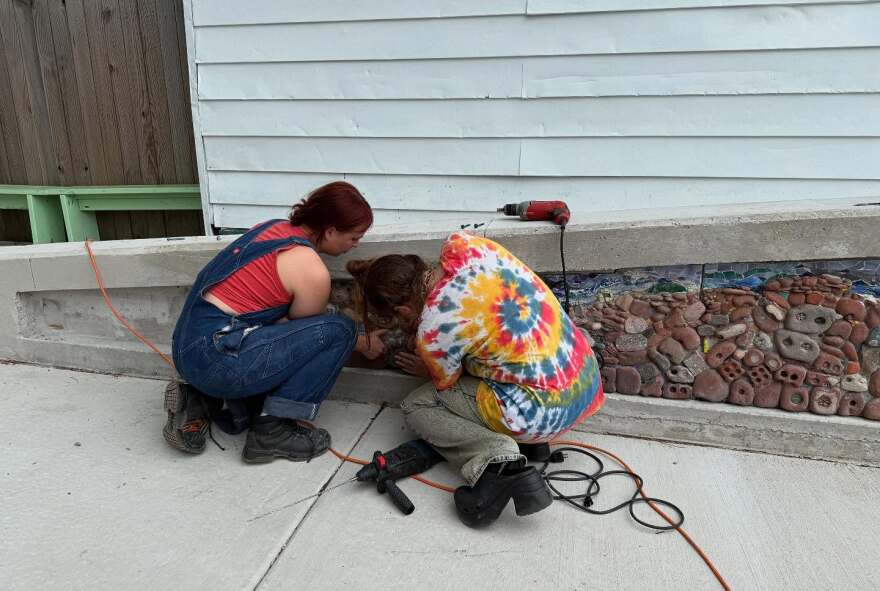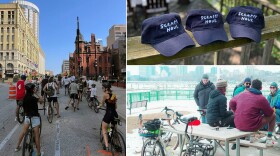They lift your spirits, prompt you to think, make you feel grateful and inspire you to do more. They connect you to our community, shining a spotlight on what's good about our city. They're stories that are Uniquely Milwaukee, sponsored by the Milwaukee Public Library.
The longer you look, the more you’ll see: little Easter eggs hidden inside Cactus Club’s new accessibility ramp. It’s part of the venue’s arts programming arm, Cactus Club+, and its mosaic was designed by local artist Kate Klingbeil.
“(The mosaic) is inspired by the lake and this place,” she explained. “I see each rock as a person involved in Cactus Club, or potentially being involved in the future. And to me, the way that the shore settles the rocks and the detritus that comes in between the cracks is, sort of, a mixture of chaos and gravity and time.”

Klingbeil has worked on this project for a year — a thoughtful approach not only because it’s her first public outdoor piece, but also because it’s being applied to something that opens Cactus Club to people like Kevin Sullivan. The Aug. 20 ramp ceremony was his first time inside the venue.
“I love it; I love the vibe of it,” he said . “It’s definitely got its own character, and I think it’s a great space for the community to come together.”
The 34-year-old has a condition called Arthogryposis Multiplex Congenita (AMC), which causes weakness and muscle contractions in his arms and legs. Orthotics help him walk, and he uses his wheelchair for longer distances.
“It can be very challenging. Accessibility varies to a wide degree,” he explained. “Luckily, there are tools that you can use like Google Maps, for instance, to see if places are accessible beforehand. But it is something I always think about every time I leave my house. It’s more than just, ‘Can I get in the front door?’ It’s, ‘Is there a place for me to sit? Is the bathroom accessible?’”
Four years ago, Sullivan saw Cactus Club’s social-media post about the accessibility initiative. He connected with owner Kelsey Kaufmann to offer ideas like a door sensor that would allow people to open the door without contact. It’s a small change that’s proven surprisingly helpful for Cactus Club employees, like Liv Weiss.
“I remember when we were so grateful and lucky to have that donated,” Weiss said. “I’m obsessed with the door sensor, and that just helps even accessibility for able-bodied people. It helps me in the morning when I’m trying to take the sign outside or take the trash out. These are things that we don’t even notice play a part in our lives that make it easier just to do simple tasks.”
Wednesday was a celebration of progress, but getting to this point wasn’t fast or easy. It started in 2021, when Kaufmann and her team connected with the city of Milwaukee about the accessibility ramp initiative. Over the years, they’ve worked to change city laws regarding ADA-compliant projects, hosted several fundraising concerts and warmly accepted hundreds of individual donations.
“I don’t think anyone could have convinced me what rolling this boulder up the hill could have possibly been,” Kaufmann said. “I thought, absolutely, there would be municipal, state, federal support to do this kind of project. And whether it was for a for-profit or nonprofit, I thought there would be more public policy and grants and resources.”

She said she feels “fortunate” to have such diverse community support and added that one of their initial funding sources came through reframing their need while combining their support of the arts.
“We got the Ruth Foundation for the Arts’ Wisconsin Special Projects Grant, and that’s what really springboarded this project and made it possible,” she said. “I think it’s important to note that we got this project, not as a capital improvement project, but as a support for an artist-in-residence program.”
Despite the progress, there have been obstacles. In May, they learned the city required construction of a curb bump out for the ramp. The additional $20,000 cost wound up being covered by a surprise donation from musician Jack White, who’s been connected to the club for many years.
While grateful for his support, Kelsey wants locals to always remember that Cactus Club is theirs.
“The answer for us as we build this model going forward is community participation, the more folks we can get involved in not just financial ways,” she said. “I think that’s really important to underscore. There are so many different ways to participate, even just offering perspective.”
Though the ramp is now accessible, there are some finishing touches to add, such as railings. Kelsey anticipates it’ll be complete by September — although that’s just the beginning. She said phase two will involve a “more significant” building expansion, including improved access to the stage, restrooms and second floor. That means more planning and fundraising to come.


















